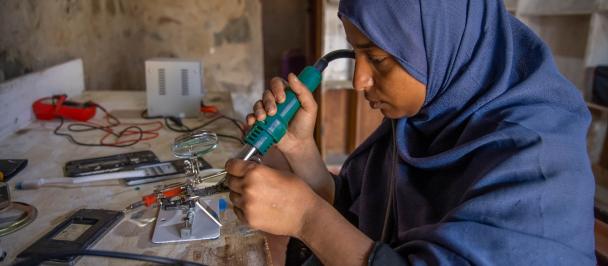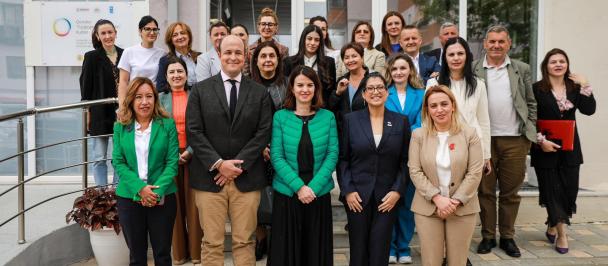Jitendra’s Legacy; Harvesting Hope for His Daughters Tomorrow
May 1, 2024

Participants of the Ministry of Agriculture organised Protective Cropping training, in collaboration with UNDP under the Markets for Change Project.
In Labasa, the Northern part of Fiji, lies the humble settlement of Korotari. Here, Jitendra Prasad and his wife, Sina Swastika Singh, toil the land as a means of livelihood for their young family. The Korotari settlement is situated twenty minutes away from Labasa main town area, and the farm and family house is easily accessible through proper infrastructure.
The Land and Its Legacy
Jitendra’s connection to the land runs deep. He hails from a lineage of sugarcane and agriculture farmers, where the land is more than just soil and dirt—it’s a land filled with dreams, possibilities and means of livelihoods. Their 5-acre plot, leased for agriculture farming serves as an important business asset for the family. Of this, 3 ½ acres are dedicated to subsistence and commercial farming, to help support their young family.
The Family Team
Jitendra and Sina are not alone in this family business endeavour. Their two young daughters, aged 3 and 4, are already learning the art of tilling and sowing as the farm is regarded as a family business occupying a majority of their time. Their day begins at five o’clock in the morning. Sina, works alongside her husband clearing the land, nurturing the plants, and harvests the vegetables ready to be supplied to the Labasa Market.
The shared responsibilities, roles and decision making is the cornerstone of their farming operation. In times of challenges, they provide mutual support and continue to share their learnings to continue to enhance both their farm and family business.

Jitendra Prasad and his wife, Sina Swastika Singh, toil the land as a means of livelihood for their young family.
The Protective Cropping Training
Recently, the couple was pleasantly surprised to be selected by the Ministry of Agriculture, in collaboration with UNDP under the Markets for Change Project, to participate in a week-long Protective Cropping training. Jitendra eagerly embraced the opportunity, eager to acquire new knowledge, techniques and strategies to counter the unpredictable weather patterns—floods, rain, and dry spells—that pose significant risks to their farming business. Sina was not able to attend due to responsibilities over their two young daughters.
Nevertheless, the week-long workshop was a great opportunity for the farmers in the North and Jitendra maximized his learning experience. In Fiji, the protected cropping for small- and medium-scale farmers is new, and a potentially transformational and enabling technology for vegetable production systems.
The impact of protected cropping for domestic food security and for economic development in rural communities has seen the production system emerge as a priority for domestic agriculture.
This capacity building training provided new knowledge to Jitendra on the hands-on training on Protective Farming Practices with a focus on:
- Understanding protected cropping structures
- Protecting your crop from weeds, pests, and diseases
- Managing your crop in a greenhouse and Managing finance and marketing
Weathering the Storms
The Northern part of Fiji is no stranger to rain. It falls incessantly, nourishing the crops but also testing the farmers’ patience. The recent floods threatened their livelihood. However, the Markets for Change Project had provided alternative solution with the introduction of greenhouse materials, to help the farmers like Jitendra and Sina. These sturdy structures shielded their vegetables, and crops, allowing them to thrive even during unfavourable weather conditions.

Jitendra eagerly embraced the opportunity, eager to acquire new knowledge, techniques and strategies at the week-long Protective Cropping training.
Diversity and Abundance
Their farm was full of varieties of vegetables and crops. The couple plant cabbage, eggplant, okra, cucumber, beans, peanuts and even Suki. The abundance of supply is then harvested and supplied to the Labasa Municipal Market. The market caters for an estimated 400 full-time vendors, and 600+ casual vendors.
Majority of the farmers grow their own produce, while others purchase wholesale. Vending is their main source of income, and on busy days they can gross anywhere from FJ$100-FJ$400 a day. Some vendors travel from rural areas and from other islands, with some coming from remote locations where travel can take 3-4 hours. Casual vendors and farmers are now selling daily instead of Thursday to Saturday only.
The market is managed by the Labasa Town Council and is an economic intervention site for market vendors and farmers in the Macuata Province. The customers are usually residents of Labasa town and neighbouring areas, as well as hotels and restaurants.

Jitendra’s connection to the land runs deep. For him and his wife, farming transcends sustenance; it is a family legacy, that they will cultivate, and bearing fruit not only for themselves but also for their daughters
Generational inspiration
Jitendra and Sina’s family story embodies the enduring essence of agriculture through seasons, cycles, and legacy that evolve across generations. With proper guidance, partnership and support, they continue to grow and impact their families and communities. For them, farming transcends sustenance; it is a family legacy, that they will cultivate, and bearing fruit not only for themselves but also for their daughters. Theirs is a story of generational inspiration, that continues to resonate within their community.
The Markets for Change Project continues to contribute to the 2030 Agenda for Sustainable Development, with multiple Sustainable Development Goals (SDGs). It supports SDG 5 on Gender Equality, SDG 8 on decent work and economic growth, SDG 10 on reducing inequalities, and SDG 11 on sustainable cities and communities. It's a project that aims to ensure equality and economic empowerment for all, including men, women, youth, people with disabilities, and marginalized minority groups.
The Markets for Change (M4C) project aims to promote gender equality by economically empowering women market vendors in Fiji, Vanuatu, Solomon Islands and Samoa. This project, which brings together various stakeholders, offers financial literacy training that connects vendors and farmers with essential service providers. This sharing of information, raising awareness, and networking opportunities have the potential to improve the livelihoods of market vendors and their families.
The M4C project is implemented by UN Women in partnership with UNDP and with support from the government of Australia. They are making a real difference in the lives of men and women like Jitendra and the wife Sina, who are driving sustainable economic growth in Labasa, the Northern part of Fiji.
For more information, please contact:
Vilisi Veibataki, Markets for Change Project Manager, UNDP Pacific Office in Fiji | vilisi.veibataki@undp.org | +679 3227701

 Locations
Locations



